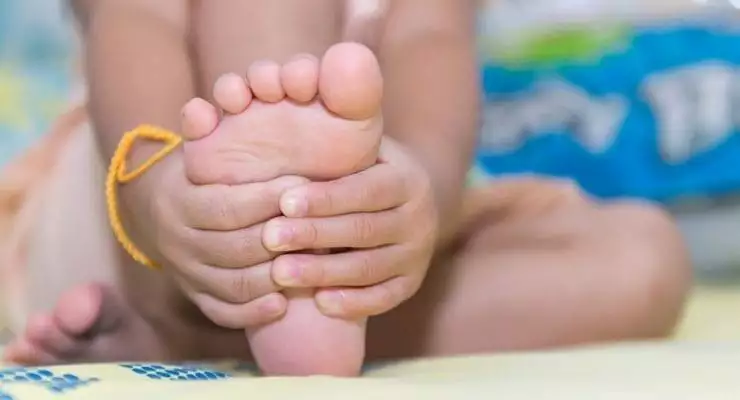While some of your child’s aches and pains have a clear and obvious cause, because children are often active and injury prone, others may not be as easy to discern. Your child may experience cramping in his feet for a variety of reasons. Determining the cause of his cramps can help you treat his condition and ease his discomfort.
Muscle Cramps
Muscle cramps occur when muscles contract involuntarily. Muscles that span between two joints are most prone to cramping, such as the calf muscle between the ankle and knee. Depending on the location of his cramps, your child’s toes may curl inward as his muscles contract. Cramps in the feet, as well as the arms and hands, are common and can be very painful.
Causes
Muscle cramps commonly occur after overuse. Repetitive and prolonged motions, such as skipping, running, jumping and hopping, may fatigue a muscle in your child’s foot, leading to cramping. Heat and dehydration can deplete the amount of electrolytes in your child’s body, which can cause cramping. Although uncommon in children, some serious conditions, such as Lou Gehrig’s disease, thyroid disease or chronic infections, may cause cramping.
Prevention
Encourage your child to drink plenty of fluids to avoid dehydration that can cause his feet to cramp. During strenuous sports and activities, sports drinks that contain electrolytes may help replace depleted minerals in her body. MedlinePlus recommends bananas and orange juice to increase her potassium intake and help prevent cramping. Also have her wear comfortable shoes that don’t bind her feet.
Self-Care
Instruct your child to massage and stretch his cramping feet to help the muscles relax. Applying heat may also help soothe the muscle. Talk to your pediatrician about giving your child nonsteroidal anti-inflammatory medication to help ease muscle cramps.
Precautions
Contact your doctor if your child experiences persistent and painful cramps that don’t resolve with self-care measures. Your doctor may perform various tests to determine the underlying cause of her cramping. Blood tests can reveal disorders in her ability to metabolize calcium, potassium and magnesium, as well as possible problems involving her kidney function and thyroid function.





